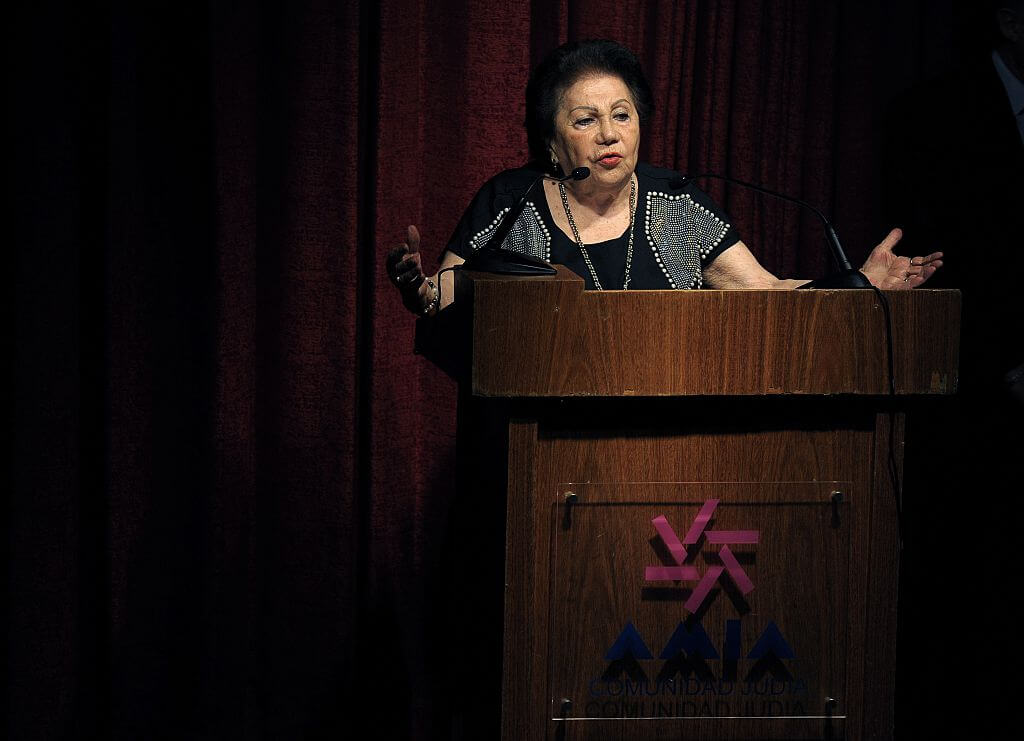Holocaust survivor who became a bat mitzvah at 91 dies in Buenos Aires
Eugenia Unger was a founding member of the Holocaust Museum of Buenos Aires

Holocaust survivor Eugenia Unger in Buenos Aires, Argentina in 2015. Photo by Getty Images
BUENOS AIRES (JTA) — Eugenia Unger, a Holocaust survivor and one of the founding members of the Holocaust Museum of Buenos Aires in 2000, died Dec. 19 in a private hospital in Buenos Aires. She was 97.
In 2017, after decades in which she shared her experiences of surviving the Majdanek and Auschwitz concentration camps, she made national news by celebrating her bat mitzvah at age 91. She was called to the Torah at the Herzliya Jewish community center and synagogue in Buenos Aires, which also organized a birthday celebration in her honor.
She told Argentine media that “the culmination of my whole life is my bat mitzvah. It is a ritual that is very important in Jewish life.”
“She had an absolute commitment to transmitting the Shoah both in Sherit Haplietá [an organization of survivors who lived in displaced persons camps] and in her fundamental role in the creation of the Holocaust Museum in Buenos Aires,” said Jonathan Karszenbaum, executive director of the museum. “She left a mark in all the testimonies she gave throughout the country, through her books, interviews, films or many other formats.”
Genia Rotsztejn was born in Warsaw, Poland on March 30, 1926. She lived in the Warsaw Ghetto as a teen and was later taken to the two Nazi camps with her family, including her parents, two brothers and a sister. She was identified by the Nazis with the number “48914.”
Unger is the only member of her family who survived the Holocaust. When she was liberated by Soviet forces, she weighed slightly more than 59 pounds.
When she returned to Warsaw, she slept on the street. “The Poles who were our friends closed the door in our faces,” she recalled in a testimony to the Shoah Foundation’s “Broken Silence” project. “When the Jews returned and claimed our properties, they killed us.”
After a journey across central Europe, she lived for two years in a refugee camp in Modena, Italy, where she met her future husband, David Unger. Both immigrated to Argentina in 1949.
She started a family; her two sons and six grandsons survive her. She wrote three books about her experiences.
In 2011, she was declared Outstanding Personality by the Buenos Aires city parliament.
“We will remember her for providing an exemplary testimony of strength in the face of adversity, demonstrating by her unwavering example that love always prevails over hate, and that life ultimately triumphs over death,” the parliament declared in an official proclamation.
This article originally appeared on JTA.org.
A message from our CEO & publisher Rachel Fishman Feddersen
I hope you appreciated this article. Before you go, I’d like to ask you to please support the Forward’s award-winning, nonprofit journalism during this critical time.
We’ve set a goal to raise $260,000 by December 31. That’s an ambitious goal, but one that will give us the resources we need to invest in the high quality news, opinion, analysis and cultural coverage that isn’t available anywhere else.
If you feel inspired to make an impact, now is the time to give something back. Join us as a member at your most generous level.
— Rachel Fishman Feddersen, Publisher and CEO